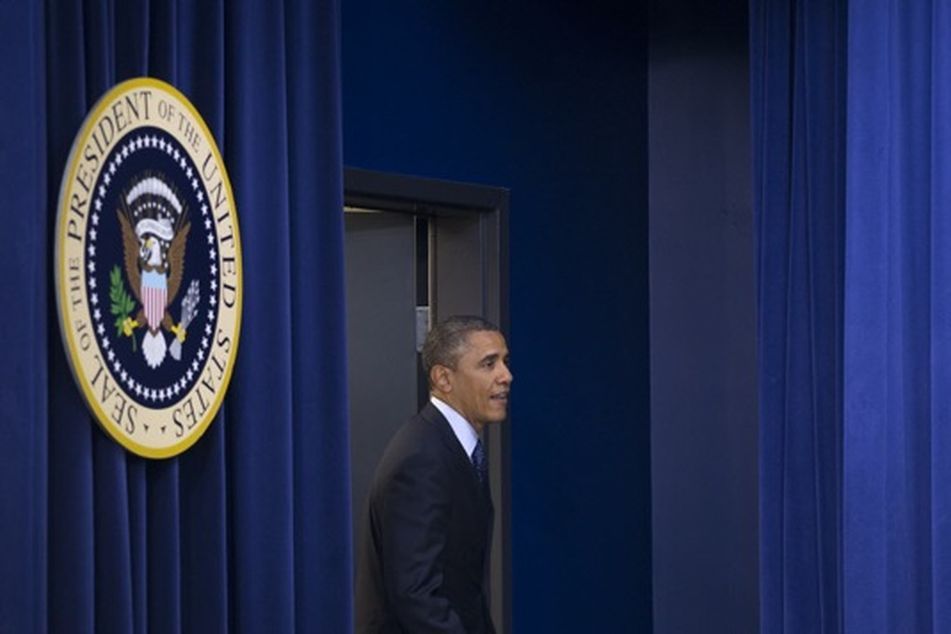Budget deal ‘in sight,’ says President
 POTUS sees modus vivendi
POTUS sees modus vivendi
It appears lawmakers have cobbled together a plan to avert the fiscal cliff. The underpinnings of the agreement? Higher taxes for high earners and large estates.
President Barack Obama said a deal to avert tax increases and spending cuts starting tomorrow is “within sight” though it hasn’t been completed.
“It appears that an agreement to prevent this New Year’s tax hike is within sight, but it’s not done,” Obama told a group of what the White House described as middle-class taxpayers. He urged people to “keep the pressure on over the next 12 hours or so; let’s get this thing done.”
Lawmakers are seeking to avert more than $600 billion in tax increases and spending cuts that make up the so-called fiscal cliff. Even if a deal is reached and can get through both chambers of Congress, it would be more limited than Obama and leaders of both parties sought. It would set up another battle early in 2013 over the budget and the federal debt limit.
The president said the main sticking point was how to avoid the automatic federal spending cuts set to begin tomorrow. Those “may not always be the smartest cuts” and would affect defense as well as programs like Head Start, he said.
Under a proposed deal, income tax cuts would be extended for annual income up to $450,000, said an official who spoke on condition of anonymity, with rates rising to 39.6 percent on income above that. Expanded unemployment insurance would be continued through 2013.
Senate Democrats
Some Senate Democrats expressed resistance toward an income threshold for increased tax rates that would be higher than the $250,000 they sought.
Senator Tom Harkin, an Iowa Democrat, said on the Senate floor this morning that he doesn’t support a $450,000 income threshold, signaling that a deal reached by Vice President Joe Biden and McConnell could lose the votes of some Democrats.
“This is one Democrat that doesn’t agree with that — at all,” Harkin said on the Senate floor. “We’re going to lock in forever the idea that $450,000 a year is middle class in America?”
Harkin didn’t answer directly when asked later whether he might use Senate rules to block a deal he didn’t agree with, saying only that there could be “extended debate.”
Capital gains and dividend rates would rise to 23.8 percent for top earners, including taxes as part of the 2010 health-care law, according to the official.
Estate tax rates would rise to 40 percent on amounts above $5 million per person. Extensions of business tax breaks would continue through the end of 2013. The measure would permanently prevent an expansion of the alternative minimum tax.
Wind Energy
The Senate Finance Committee in August approved extending miscellaneous tax breaks through 2013, including benefits for wind energy, corporate research and multinationals’ overseas finance operations.
The potential deal also would avert a cut in Medicare payments to doctors through 2013.
Earlier in the day, Senate Majority Leader Harry Reid said negotiators could reach a U.S. budget deal today that would protect all but top earners from a tax increase next year.
Democrats have sought to delay the automatic federal spending cuts for two years, at a cost of $200 billion, though they haven’t identified other savings to pay for it.
Biden and McConnell are discussing a possible two-month delay in the spending cuts, while Senate Democratic leaders had been pushing for at least a yearlong extension, according to a congressional aide close to the negotiations. A two-month pause in the automatic cuts would require $24 billion in additional savings that Republicans are demanding in exchange.
Budget Savings
Republicans insisted that the spending cuts be offset with savings elsewhere in the budget and that new revenue should be used to reduce the deficit.
Representative Mike Rogers, a Michigan Republican, said House Speaker John Boehner has been “hands off” in the Senate negotiations.
“When it comes here we’ll figure out what we can pass,” Rogers told reporters. “If we don’t have real spending cuts, I don’t think it could pass the House of Representatives.” He said a House vote would be more likely tomorrow even if the Senate agreed on a plan today.
Boehner has previously said he would bring any budget legislation passed by the Senate to the House floor, though members may decide to amend it.
Market Reaction
Stocks pared gains after Obama’s statement. The Standard & Poor’s 500 Index rose 0.6 percent to 1,410.91 at 1:55 p.m. in New York, after jumping as much as 1.1 percent as Obama began to speak. The benchmark 10-year Treasury bond yield increased six basis points, or 0.06 percentage point, to 1.76 percent at 1:58 p.m. in New York, according to Bloomberg Bond Trader prices.
Tax cuts first enacted during George W. Bush’s presidency are scheduled to expire tonight. Obama and other Democrats have sought to extend the reductions for married couples’ income up to $250,000 a year while letting tax rates rise for income above that amount. Republicans oppose tax rate increases for any income level.
Allowing the fiscal changes to take effect would cause a recession in the first half of 2013, according to the Congressional Budget Office.
In the event the Senate can’t reach a compromise, Obama has asked Reid to ready a bare-bones bill for a vote today to extend expanded unemployment benefits and tax cuts on family income up to $250,000.
If Congress does nothing, taxes will rise in 2013 by an average of $3,446 for U.S. households, according to the nonpartisan Tax Policy Center in Washington.
Tax filing for as many as two-thirds of U.S. taxpayers could be delayed into at least late March. Defense spending would be cut, and the economy would probably enter a recession in the first half of 2013, according to the Congressional Budget Office.
The effects of the higher tax rates and federal spending cuts would accumulate over a matter of months. Congress could reverse them by acting retroactively in 2013.
–Bloomberg News–
Learn more about reprints and licensing for this article.






